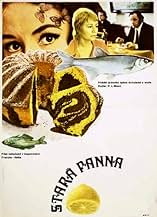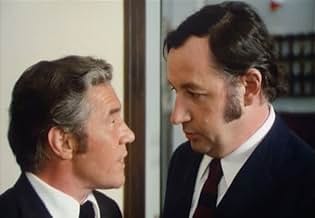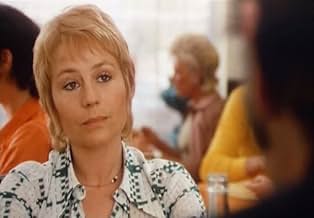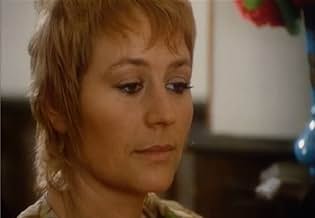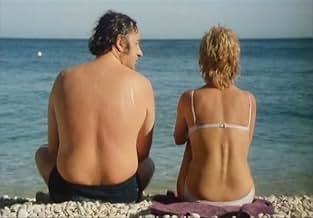IMDb-BEWERTUNG
6,8/10
637
IHRE BEWERTUNG
Füge eine Handlung in deiner Sprache hinzuA shy thirty year old woman and an aging bachelor find a way to each other, after initial complications.A shy thirty year old woman and an aging bachelor find a way to each other, after initial complications.A shy thirty year old woman and an aging bachelor find a way to each other, after initial complications.
- Regie
- Drehbuch
- Hauptbesetzung
- Auszeichnungen
- 4 Gewinne & 3 Nominierungen insgesamt
Albert Simono
- Daniel
- (as Simono)
Michael Lonsdale
- Monod
- (as Michel Lonsdale)
Empfohlene Bewertungen
a love story. or only drawing of deep solitude. few portraits. meetings. and the salt air of a holiday.a film about common events, old words, not surprising choices. minimalist and honest. nothing strange, nothing unknown. almost a documentary.but it is different not only for dialogs or performance of lead actors, for mixture of characters silhouettes or for few scenes but for force of measure, for the isle of silences, for the skin of existences, fragile, strange, gauzy. collection of faces, gestures and search to escape from yourself, useful art lesson, demonstration of great importance of small things, bitter, nice, cold, it is, like each good movie, only a mirror.
A man and a woman meet in the same hotel in the south of France, while spending their respective holidays alone.
The movie was released in 1972, when an unmarried woman of 30 was still called "spinster" and people, either men or women, were mocked for their being single, in two different ways.
Several moments of inappropriate humor follow each other: "Do you want a room in order to sleep or to make love?" asks the receptionist, and suddenly shows a false embarrassment, hiding some mockery, when he sees that the man who has just asked for a room is alone.
The woman is constantly shown on her own on the beach, making clumsy moves inside a big poncho to change out of her wet swimsuit, while around her, groups of people chat, flirt, and enjoy happily.
In this movie (and the French should be known for being open-minded and avant-garde...) single people are sort of "aliens", lonely, goofy and pitiful and, when a man and a woman of that kind meet, it seems they are required to "combine their loneliness", no matter if they might not like each other completely.
The same mocking humor invests the minor characters, no more than caricatures (the nymphomaniac chambermaid, the Anglican priest always talking of death, his wife who fasts and has stigmata drawn on her hands and feet...). Nothing happens, except for some stupid dialogues and some small awkward incidents, the background of the two characters is not revealed and a possible relationship between the two is just a (future) possibility.
And what does the ending mean, with the two young girls, the same who talk nonsense in the first scene, now missing their train?
If the original title is disrespectful, the Italian one, "La tardona", is highly offensive.
I discovered this French drama back in the late seventies, on TV. I was still a kid but already loved it for its sensitivity, so fragile touch to describe human relations, and in a so realistic, accurate way. Both Philippe Noiret and Annie Girardot are absolutely stunning, terrific here, moving. I can't imagine anyone to remain cold in front of such a story. It is never lame, cheesy, dumb.... It reminds me a bit MADEMOISELLE CHAMBON , back in 2009, starring Vincent Lindon and Sandrine Kiberlain. Not the same story, not the same plot, but same character symphony and powerful way of showing it. Only an excellent film director could do it.
A look back into a time gone by, quaint, quiet, fun in a subtle way, unrushed and relaxing. Many enjoyable details and references to that particular age in time which may not appeal to a younger audience (who may well be offended) but nevertheless has quite an authentic air to it.
I enjoyed the many scenes around the table in the dining room where people day after day are joined in communal dining which was common back around those days, jere I think more of 60s than 70s.
The most interesting aspects are not what is being said in words but in gestures and facial expressions.
Watching this movie is like time travelling, like enjoying the bouquet from a bottle of 1972 Cornas that is but a shadow of its youth but nevertheless charming and interesting.
I enjoyed the many scenes around the table in the dining room where people day after day are joined in communal dining which was common back around those days, jere I think more of 60s than 70s.
The most interesting aspects are not what is being said in words but in gestures and facial expressions.
Watching this movie is like time travelling, like enjoying the bouquet from a bottle of 1972 Cornas that is but a shadow of its youth but nevertheless charming and interesting.
This is a story about "fitting in" where you (and everyone else for that matter) are the odd man.
"La Vieille Fille" is a chronological jig-saw puzzle. You get all the pieces in their proper order but as they are all laying "face down" you never know what the next piece will be until it's turned over and inserted into its' place. That's the way the story plays out.
Each scene is more like a series of still-photographs rather than a motion picture. Dialog is sparse. Actually, "dialog" is a bad choice of expression, as most scenes consist of a monologue. It must have been a very difficult film to direct. But as daunting a task in creating this film, as it must have been - it has succeeded! The short scenes and long, silent spaces give the male thinker time to identify himself. The mood is tangible.
Philippe Noiret has been around for a long time and he's always a welcomed contributor to any film. He does very well in "La Vieille Fille". If you choose to see this film your eye will be upon him the whole length of it and once you get settled into the story you'll begin to think it is you (yourself) prodding along, scene after scene - not Noiret right to the final, parting shot.
WARNING: "Matrix" and "Die Hard" fans - look elsewhere. You'll find no exploding automobiles and ticking bombs here and you'll end up slitting your wrists or stringing yourself up before the film is half-way through.
"La Vieille Fille" is a chronological jig-saw puzzle. You get all the pieces in their proper order but as they are all laying "face down" you never know what the next piece will be until it's turned over and inserted into its' place. That's the way the story plays out.
Each scene is more like a series of still-photographs rather than a motion picture. Dialog is sparse. Actually, "dialog" is a bad choice of expression, as most scenes consist of a monologue. It must have been a very difficult film to direct. But as daunting a task in creating this film, as it must have been - it has succeeded! The short scenes and long, silent spaces give the male thinker time to identify himself. The mood is tangible.
Philippe Noiret has been around for a long time and he's always a welcomed contributor to any film. He does very well in "La Vieille Fille". If you choose to see this film your eye will be upon him the whole length of it and once you get settled into the story you'll begin to think it is you (yourself) prodding along, scene after scene - not Noiret right to the final, parting shot.
WARNING: "Matrix" and "Die Hard" fans - look elsewhere. You'll find no exploding automobiles and ticking bombs here and you'll end up slitting your wrists or stringing yourself up before the film is half-way through.
Wusstest du schon
Top-Auswahl
Melde dich zum Bewerten an und greife auf die Watchlist für personalisierte Empfehlungen zu.
Details
- Laufzeit1 Stunde 25 Minuten
- Sound-Mix
- Seitenverhältnis
- 1.66 : 1
Zu dieser Seite beitragen
Bearbeitung vorschlagen oder fehlenden Inhalt hinzufügen

Oberste Lücke
By what name was Das späte Mädchen (1972) officially released in India in English?
Antwort
